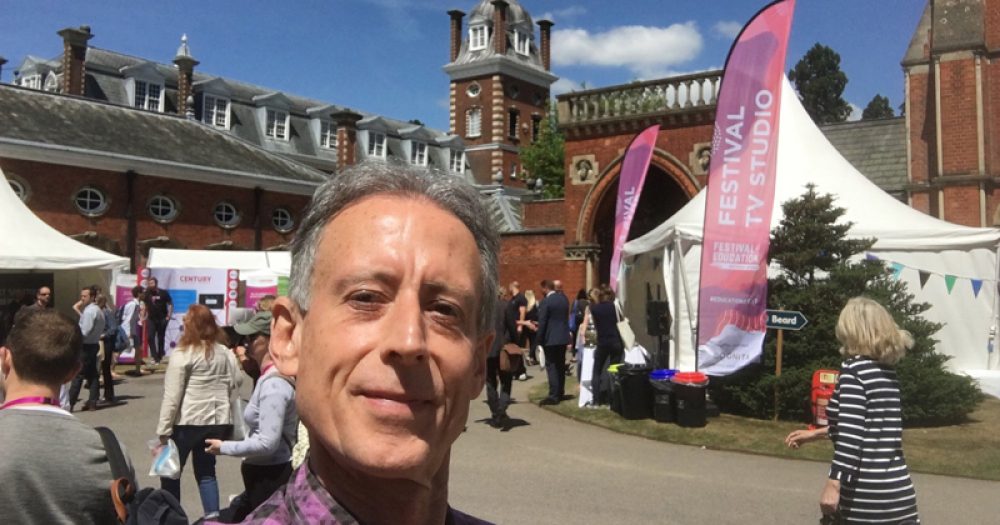Parents who want their children to opt out from sex and relationships education (SRE) lessons should have to go into schools and “physically” remove their child from each lesson, according to leading human and LGBT+ rights campaigner Peter Tatchell.
The activist told the Festival of Education that new compulsory sex and relationships education lessons, which are supposed to come in next year, must happen at least once a month and start from the first year of primary school.
Although he said schools should give parents “reassurance that the priority of these lessons is to protect their children”, he insisted parents should not be allowed to opt out of the lessons on behalf of their children – just as they cannot remove their children from maths or history.
If the opt-out must be enforced, parents should be made to come to the school and “physically” remove their child from each lesson, he said.
Tatchell said schools should teach pupils about all aspects of sex, including how to do it well and information on preferences and fetishes. He has also created a 13-point list of things schools should teach pupils, and believes teachers shouldn’t be afraid to tackle tricky issues.
“Young people complain that relationship and sex education is woefully inadequate and doesn’t address many of the issues that concern them,” he said.
“It’s so vital that schools fill the void. If teachers don’t provide this information, kids will pick up often partial, inaccurate or sensationalist information from social media and porn sites.”
Mark Lehain, director of the Parents and Teachers for Excellence Campaign and interim director of the New Schools Network, said Tatchell’s points are a “solid starting point” but warned SRE should be covered “in a sensitive manner in order that parents are comfortable with the approaches taken and messages communicated”.
“Parents have ultimate responsibility for their children’s education, and effective SRE involves a strong partnership between a child’s family and their school,” he said.
Peter Tatchell’s 13-point guide to what schools should teach about sex
1. Sexual rights are human rights
It is a fundamental human right to love an adult of either sex, to engage in any mutually consensual, harmless sexual act with them and to share a happy, healthy sex life.
2. The right to sexual self-determination
Young people should be taught to assert their right to determine what they, and others, do with their body – including the right to abstain from sex, say “no” and report abusers.
3. A new ethical framework: mutual consent, respect and fulfilment
Mutual consent, reciprocal respect and shared fulfilment apply universally, regardless of whether people are married or single, monogamous or promiscuous, and whatever their sexuality.
4. Promoting safer alternatives
If schools are serious about cutting the incidence of teen pregnancies, abortions and HIV infections, they should highlight safer, healthier alternatives to sexual intercourse, including oral sex and masturbation.
5. Sex is good for you
SRE lessons should acknowledge that sex is natural, wholesome, fun and (with safe sex) healthy, and can have a very beneficial effect on our mental and physical wellbeing.
6. Give kids all the facts
Sex education should tell the truth about every kind of sex and relationship – including sexual practices that some people find distasteful.
7. All sexualities are equally valid
Schools should encourage understanding and acceptance of heterosexual, homosexual and bisexual orientations, and transgender and intersex identities.
8. How to have good sex
SRE for 16+ pupils should include advice on how to achieve mutually-fulfilling, high-quality sex.
9. Live and let live
Providing behaviour is consensual, between adults, where no-one is harmed and the enjoyment is reciprocal, schools should adopt a non-judgemental live-and-let-live attitude to sexual preferences.
10. Education from the first year of primary school
SRE should start from the early years of primary school by talking about puberty and, to tackle abuse, inappropriate touching. It should become more detailed and explicit at secondary level.
11. Respect for sexual diversity
Teachers have a duty to validate the diversity of adult sex and relationships that fall within the ethical framework of mutual consent, respect and fulfilment.
12. Overcoming sex shame to tackle abuse
SRE should encourage pupils to have more open attitudes towards sex so that they are more likely to disclose abuse.
13. Mandatory lessons and a revised parental opt-out
SRE should be taught at least monthly all throughout a child’s school life, and parents who want to withdraw their children should be required to come to each lesson and physically remove their child.







Peter Tatchell is no more an authority on sex than the next person; why should we listen to him? When we see the egregious effects of the first Sexual Revolution in the 1960s still rippling out (skyrocketing STIs, children who will grow up in poverty without a father, sexting, a pornography explosion, climbing mental health problems among the young, 8 million abortions, high rates of teenage pregnancy, sexualisation of the young etc etc) we need to retrace our steps and see where we went wrong. We need this second Sexual Revolution – absolutely anything goes, however perverse – like a hole in the head. Sex was designed for a man and a woman in a lifelong, publically-owned, exclusive commitment (marriage) such that children that result from such a committed union can be brought up with emotional and financial security for the best chance of spiritual, moral, educational and physical flourishing. Sex is marriage glue. Fire is useful for many things, but unless we keep it in the fireplace, it will burn the house down; likewise, sex belongs in marriage. We need to be teaching our children (parents, grandparents, churches, synagogues, mosques, Boy Scouts, Girl Guides etc) to be sexually continent until marriage for optimal human flourishing, and then leave schools to teach maths, English, music etc.
Peter Tatchel wrote to a national newspaper in support of the Paedophile Information Exchange. He announced that sex between children and adults was not necessarily a bad thing. I have a copy of that letter, as do many other women and men who are concerned that children are not taught adequately that they have boundaries and that no one can touch them if they don’t want them too.
Now PIE has rebranded as MAP – Minor Attracted People. They are looking to join with the variety of sexuality and identities in Pride. This Is a matter of great concern. Adults can do what they want with whoever wants them. But NOT children. Boundaries are vital.
This is just ridiculous . What happened to parental rights? Teaching primary school children about sex from such a young age will ruin their innocence . Yes it is important to be tolerant about other beliefs and orientations but this is like brainwashing the children and will expose them early sex and pornography instead of protecting their innocent minds . Parents should be allowed to exclude their children from such curriculum.
I don’t think he is saying we should introduce pornography to children and I may have missed it but I didn’t see the primary schools – I think a lack of healthy sex education in schools is causing people to try to fill in the blanks through watching porn and gaining unhealthy perspectives of how things work. I understand preserving innocence in children is what parents want but how are they meant to be okay about sex when its discussed as such a dirty thing and a prevailing lack of explanation can leave people vulnerable. as well as the rise in technology – it is ever more apparent that young children might see something on the internet that they are embarrassed to ask about so form there own opinions on the subject and ask their peers instead of getting nonbiased answers from schools – who would give correct answers.
I think you have completely missed out the ‘Primary’ teachers of children….the parents!, do you think we cannot protect our kids from grooming, sexting, pornography, bullying, moral teaching, love and respect for others, no matter what they do (it doesn’t mean we agree or condone it) what do you think parents do, pack their kids off to school, pick them up feed them and send them to bed? and by the way schools do not always give ”correct answers” they can’t stop teen pregnancies, bullying, sexting, stabbings, etc, and that’s AFTER they have had children for 16 years !
You are right, I have opted out for my children and we sat them down with my husband and spoke to them individually when the time came. Just like Neil said, we are the primary teachers of our children. We give birth to them, feed them, clothed them. All of this demands the sacrifice of our time and money, and it’s not right that someone else comes and corrupts their mind. My kids have grown up fine without being wild, and they had had no sex education at school. Furthermore, they were very focused on their studies and had brilliant times in their schools without having the pressure of knowing too much of sex. We are the parents, so we should have the right to opt-out or not in anything that we don’t want to corrupt and spoil our children.
I completely agree with Peter Tatchell’s comments though they are controversial I believe having more open discussions in schools with correct information will be a lot more beneficial to students. A recent study showed 90% of teens are watching porn, where safe sex is not being shown and a lot of porn plays out unrealistic standards and practices to adhere too. One in five women in England and Wales have experienced some type of sexual assault since the age of 16, according to official analysis of violent crime figures I’m not saying porn is the culprit its a lot more complicated than that but perhaps teaching boys and girls about sex in a healthy way will help young people realize what’s right and what’s wrong and help them fill in blanks that they use the internet to fill . The Council of Europe also believes in order for young people to reach their full potential it is crucial for them to acquire information and form attitudes beliefs and values about identity, relationships, and intimacy. We want these to be healthy views and although they are a lot of equipped parents out there ready to deal with this their is no law or guarantee that every child will receive the appropriate information. Bringing this information into schools will ensure every student is well informed and the media representation of sex will be understood as ‘not real life’
I do t agree.